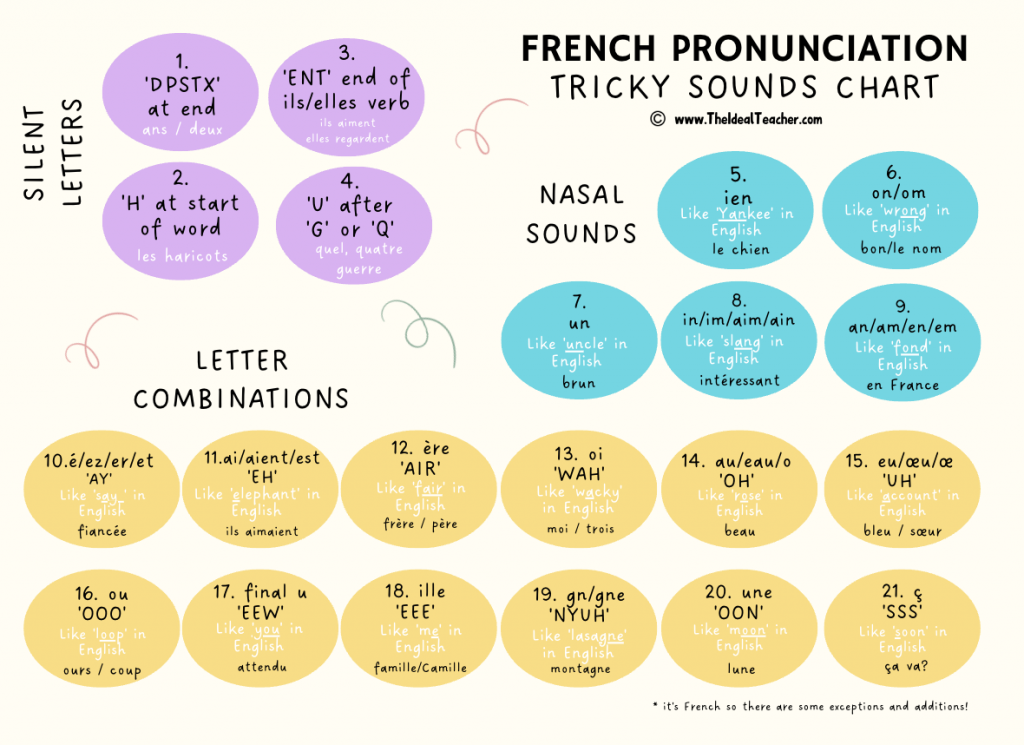8 French Pronunciation Tips for Beginners To Easily Improve Confidence in Speaking
 Want to know how to improve your French pronunciation? Well, if you are learning French and want to feel more confident with the sounds that the letters make, then these awesome tips and hacks are here to help.
Want to know how to improve your French pronunciation? Well, if you are learning French and want to feel more confident with the sounds that the letters make, then these awesome tips and hacks are here to help.
Mastering French pronunciation can be a particularly challenging aspect when learning French. Nonetheless, it’s essential to understand and be understood!
From my own experience of learning the language and teaching it, the unique sounds and phonetic concepts in French often differ from those in English, leading to common mistakes and difficulties for beginners. In this ‘how to improve your French pronunciation’ post, I will share effective techniques, exercises and resources to help you enhance your French pronunciation skills. So, let’s get started!
 1. Understanding the Challenges of French Pronunciation
1. Understanding the Challenges of French Pronunciation
 First of all, one of the main challenges learners face is the difference in pronunciation between French and English, as well as French and other first languages. In addition, common mistakes often occur when pronouncing letters combined in French words. For instance, the acute accent on the letter “e” and the cedilla on “c” can cause confusion. Additionally, sounds like “ch,” “oi,” “eu,” “eau,” and “au” can be tricky to pronounce correctly.
First of all, one of the main challenges learners face is the difference in pronunciation between French and English, as well as French and other first languages. In addition, common mistakes often occur when pronouncing letters combined in French words. For instance, the acute accent on the letter “e” and the cedilla on “c” can cause confusion. Additionally, sounds like “ch,” “oi,” “eu,” “eau,” and “au” can be tricky to pronounce correctly.
2. How To Improve French Pronunciation Techniques
A) Learning Sounds
Firstly, I would recommend getting used to French vowel sounds, nasal sounds, and tricky consonants. Practise these sounds individually and in various word combinations to develop muscle memory. Subscribe to our YouTube channel and check out the French pronunciation hacks, tips and tricks to help you with this.If it’s helpful, feel free to download my French pronunciation ‘tricky sounds’ chart to keep and refer to. It’s got the French ligature, with my interpreted sound (which usually helps my students!), as well as an example of the sound in an English word, additionally. there is an example or two of a French word.
B) Listening and Reading Aloud
Similarly, once you feel a bit more confident with how French words sound, focus on varied listening practice and read aloud French texts. To get you started, try reading the transcripts from my French listening practice activities aloud? Basically, pay attention to the sounds, intonation, and rhythm of the language. This will train your ears and tongue to become more attuned to French pronunciation patterns. I absolutely recommend this one! Ensure you record yourself back and listen out to the sounds. Even better, get someone who knows how the words should be pronounced to listen and provide you with feedback to improve your pronunciation skills.
C) Mimicking
An effective technique is to imitate native French speakers. Specifically, listen to authentic French audio materials, such as French songs, podcasts, or movies, and try to repeat the sounds and rhythms you hear. Check out my 6 French Listening Websites To Improve Your Listening to help with that.
D) French Speaker / Experienced French Tutor Assistance
Consider working with a qualified French teacher or a native French speaker who can offer personalised guidance and correct your pronunciation mistakes. They can help you identify specific areas for improvement and offer specific exercises which will help you improve your French pronunciation.
E) Tackling French Pronunciation With The “R” Sound
The French “r” sound is super tricky! Here are a few steps to help you overcome this hurdle:
1. Firstly, open your mouth. Then, close your throat as if you’re going to gargle or to avoid swallowing whatever it is that you normally drink and say “k” carefully, several times.
2. Really focus on where in your throat the k sound is made. Next, begin slowly closing your throat until you can almost feel where you made that ‘k’ sound. Your throat should be only partially constricted. You then need to tense the muscles around this area.
3. Gently push air through your partially-constricted throat and practice saying “ra-ra-ra” a few times a day.
F) Regional Variations and Tongue Twisters in French
Be aware that there are regional variations in French pronunciation. Different French-speaking countries or regions may have their own specific accents and pronunciation patterns. Exposure to diverse accents through movies, podcasts, and conversations will help you become more adaptable and attuned to these variations.
You can practice specific sounds and pronunciation patterns through French tongue twisters. As an illustration, here are a few examples to get you started:
Tongue Twisters in French To Practise Pronunciation
Les chaussettes de l’archiduchesse sont-elles sèches ou archisèches ? (Are the archduchess’ socks dry or extra dry?) [Lay show-set de l’ar-shee-du-shess son-tell seh-sh or ar-sheh-sh.]
Un chasseur sachant chasser sait chasser sans son chien. (A hunter who knows how to hunt can hunt without his dog.) [Un shah-sir sah-shah shay sah-shah san sohn shee-ahn.]
Si six scies scient six cyprès, six cents scies scient six cent cyprès. (If six saws saw six cypresses, six hundred saws saw six hundred cypresses.) [See sees see-sont sees seep-res, sees sant see sehn seep-res.]
Tonton, ton thé t’a-t-il ôté ta toux ? (Uncle, did your tea cure your cough?) [Tawn-tawn, ton tay ta-teel oh-tay ta toh.]
Quand un pingouin prend un goûter, gare au goûter du pingouin ! (When a penguin has a snack, watch out for the penguin’s snack!) [Kahnd un pang-wahn prahn un goo-tay, gar oh goo-tay du pang-wahn!]
Cinq gros corbeaux dans la cour croassent sans répit. (Five big crows in the yard caw without respite.) [Sank groh kor-boh dahn la coor kroh-sont san ray-pee.]
Trente-trois tortues têtues trépignent dans la toundra. (Thirty-three stubborn turtles are stomping in the tundra.) [Trant-trwah tor-tu tet-tu treh-pee-nyahn dahn lah toon-dra.]
Six cents scies sèches dansent devant les cinq cyprès. (Six hundred dry saws dance in front of the five cypresses.) [Sees san suh-ee sehn dans dev-ahn lay sank seep-res.]
Les plages de l’Ouest sont pleines de coquillages. (The beaches in the West are full of seashells.) [Lay plaj duh loh-est son plehn duh kok-ee-yahj.]
2. Emphasising French Rhythm and Intonation
Rhythm and intonation play a vital role in French pronunciation. The liaison, where the final consonant of a word links with the following vowel, contributes to the flow and naturalness of spoken French. Practice the liaison by reading texts (from a newspaper or msn.fr etc) or transcripts from audio clips aloud and pay attention to the connected sounds.
Why not try reading these mini paragraphs on topics of potential interest aloud in French to get you started?
CEFR A1/A2 Level Reading Aloud Practice
Les vacances d’été sont un moment excitant de l’année. De nombreux jeunes adorent partir en camping avec leur famille. C’est l’occasion de profiter du beau temps, de se détendre et de participer à des activités de plein air. Beaucoup de campings proposent des animations pour divertir les enfants et les adolescents. Les campeurs peuvent se faire de nouveaux amis et créer des souvenirs inoubliables. Le camping est une excellente façon de se ressourcer et de vivre des aventures en pleine nature.
La musique occupe une place importante dans ma vie. J’apprécie particulièrement le rock et la pop. J’aime écouter des artistes internationaux ainsi que des groupes locaux. La musique me permet de m’évader, de me détendre et de m’exprimer. J’assiste également à des concerts et à des festivals pour vivre l’expérience en direct. La musique est un langage universel qui rassemble les gens et crée des émotions intenses.
L’importance de l’exercice physique pour la santé ne peut être surestimée. Il est recommandé de pratiquer une activité physique régulière pour maintenir une bonne condition physique et mentale. Il existe de nombreuses options pour rester actif, comme la course à pied, la natation, le vélo ou la danse. En plus des avantages physiques, l’exercice favorise également la libération d’endorphines, les hormones du bonheur. Trouvez une activité qui vous plaît et qui correspond à votre niveau de forme physique, et essayez de l’incorporer dans votre routine quotidienne.
CEFR B1/B2 Level Reading Aloud Practice
La pollution de l’environnement est un problème mondial qui nécessite une action immédiate. Les gouvernements doivent mettre en place des politiques efficaces pour réduire les émissions de gaz à effet de serre. De plus, les entreprises devraient adopter des pratiques plus durables. Il est essentiel que chacun prenne conscience de son impact sur l’environnement et prenne des mesures pour le préserver. En travaillant ensemble, nous pouvons créer un avenir plus propre et plus sain pour les générations futures.
La diversité culturelle est une richesse inestimable pour notre société. En rencontrant des personnes de différentes origines et en partageant nos traditions, nous élargissons nos horizons et développons une compréhension mutuelle. Les échanges culturels favorisent l’ouverture d’esprit et contribuent à la construction d’une société plus tolérante et inclusive. Il est important de célébrer nos différences et de promouvoir le respect et l’acceptation de toutes les cultures.
L’enseignement des langues étrangères est crucial pour former des citoyens du monde compétents et ouverts d’esprit. Apprendre une langue étrangère offre de nombreux avantages, tels que la possibilité de communiquer avec des personnes d’autres pays et de découvrir de nouvelles cultures. De plus, cela améliore les compétences cognitives, la flexibilité mentale et la capacité à s’adapter à des situations variées. Il est essentiel d’encourager l’apprentissage des langues dès le plus jeune âge et de promouvoir la diversité linguistique dans nos établissements scolaires.
3. Incorporating Beginner French Pronunciation Practice into Your Routine
To make consistent progress in your pronunciation skills, incorporate regular practice into your daily routine. Here’s a helpful mnemonic to remember the key aspects of pronunciation that have been discussed in this blog post:
S.O.U.N.D.S
- S: Study the pronunciation guides and resources.
- O: Observe and imitate native French speakers.
- U: Understand the common pronunciation challenges.
- N: Nail the vowel sounds, nasal sounds, and tricky consonants.
- D: Devote daily practice to improve your pronunciation.
- S: Seek feedback from tutors or native speakers.
4. Immersion Programs and Cultural Experiences
If you have the budget, or the means, immersing yourself in a French-speaking environment can greatly enhance your pronunciation skills. Particularly, because you are fully exposed! For example, consider participating in French language immersion programs or cultural experiences in French-speaking countries. Interacting with native speakers will expose you to authentic pronunciation and provide valuable opportunities to practice and receive feedback. All of which are key in improving your pronunciation skills
5. The Power of Practice and Feedback
Finally, remember that consistent practice and receiving feedback are key to improving your French pronunciation. Continue to practise regularly, seek feedback from native speakers or tutors, and be open to constructive criticism. Over time, you will feel more confident as your pronunciation skills improve!
So, to conclude, improving your French pronunciation is an ongoing journey that requires not only patience, but also dedication, and likewise practice. By employing effective techniques, using helpful resources, and immersing yourself in French language and culture, you can consequently make significant strides in your pronunciation skills. Embrace the challenge, enjoy the process, and soon you’ll be speaking French with confidence and fluency!
Have you seen?
Speaking Questions By Topic To Practise Speaking in French
Remember to subscribe to my YouTube Channel to access more useful French learning materials for beginners.
JOIN ME ON MY SOCIALS FOR MORE FAB TEACHING CONTENT >>


 1. Understanding the Challenges of French Pronunciation
1. Understanding the Challenges of French Pronunciation


